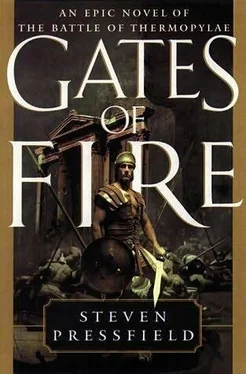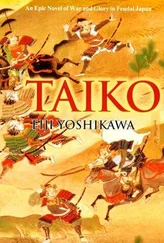Steven Pressfield - Gates of Fire - An Epic Novel of the Battle of Thermopylae
Здесь есть возможность читать онлайн «Steven Pressfield - Gates of Fire - An Epic Novel of the Battle of Thermopylae» весь текст электронной книги совершенно бесплатно (целиком полную версию без сокращений). В некоторых случаях можно слушать аудио, скачать через торрент в формате fb2 и присутствует краткое содержание. Жанр: Историческая проза, на английском языке. Описание произведения, (предисловие) а так же отзывы посетителей доступны на портале библиотеки ЛибКат.
- Название:Gates of Fire: An Epic Novel of the Battle of Thermopylae
- Автор:
- Жанр:
- Год:неизвестен
- ISBN:нет данных
- Рейтинг книги:3 / 5. Голосов: 1
-
Избранное:Добавить в избранное
- Отзывы:
-
Ваша оценка:
- 60
- 1
- 2
- 3
- 4
- 5
Gates of Fire: An Epic Novel of the Battle of Thermopylae: краткое содержание, описание и аннотация
Предлагаем к чтению аннотацию, описание, краткое содержание или предисловие (зависит от того, что написал сам автор книги «Gates of Fire: An Epic Novel of the Battle of Thermopylae»). Если вы не нашли необходимую информацию о книге — напишите в комментариях, мы постараемся отыскать её.
Gates of Fire: An Epic Novel of the Battle of Thermopylae — читать онлайн бесплатно полную книгу (весь текст) целиком
Ниже представлен текст книги, разбитый по страницам. Система сохранения места последней прочитанной страницы, позволяет с удобством читать онлайн бесплатно книгу «Gates of Fire: An Epic Novel of the Battle of Thermopylae», без необходимости каждый раз заново искать на чём Вы остановились. Поставьте закладку, и сможете в любой момент перейти на страницу, на которой закончили чтение.
Интервал:
Закладка:
My master himself bore the spare shield chassis with double bronze facings, both our shoes and strapping, rivets and instrument kit, his leather corselet, two ash and two cornelwood spears with spare ironheads, helmet, and three xiphe, one on his hip and the other two lashed to the fortypound rucksack stuffed with more rations and unmilled meal, two skins of wine and one of water, plus the goodie bag of sweetcakes prepared by Arete and his daughters, double-wrapped in oiled linen to keep the onion stink of the rucksack from invading it. All up and down the column, squire and man humped loads of two hundred to two hundred and twenty pounds between them.
The column had acquired a nonrostered volunteer. This was a roan-colored hunting bitch named Styx who belonged to Pereinthos, a Skirite ranger who was one of Leonidas' king's selections.
The dog had followed its master down to Sparta from the hills and now, having no home to return to, continued her attendance upon him. For an hour at a crack she would patrol the length of the column, all business, memorizing by scent the position of each member of the march, then returning to her Skirite master, who had now been nicknamed Hound, there to resume her tireless trot at his heel. There was no doubt that in the bitch's mind, all these men belonged to her. She was herding us, Dienekes observed, and doing a hell of a job.
With each passing mile, the countryside grew thinner. Everyone was gone. At last in the nation of the Phokians, nearing the Gates, the column entered country utterly denuded and abandoned. Leonidas dispatched runners into the mountain fastnesses to which the army of the locals had withdrawn, informing them in the name of the Hellenic Congress that the allies stood indeed upon the site and that it was their intention to defend the Phokians' and Lokrians' country whether these themselves showed their faces or not. The king's message was not inscribed upon the customary military dispatch roll, but scribbled on that kind of linen wrapper used to invite family and friends to a dance. The final sentence read: Come as you are.
The allies themselves reached the village of Alpenoi that afternoon, the sixth after the march-out from Lakedaemon, and Thermopylae itself half an hour later. Unlike the countryside, the battlefield, or what would become the battlefield, stood far from deserted. A number of denizens of Alpenoi and Anthela, the north-end village that fronts the stream called Phoenix, had erected makeshift commercial ventures. Several had barley and wheat bread baking. One fellow had set up a grogshop. A pair of enterprising trollops had even established a two-woman brothel in one of the abandoned bathhouses. This became known at once as the Sanctuary of Aphrodite Fallen, or the two-holer, depending upon who was seeking directions and who proffering them.
The Persians, the rangers reported, had not yet reached Trachis either by land or sea. The plain to the north lay yet unpopulated by the enemy camp. The fleet of the Empire, it was reported, had put out from Therma in Macedonia either yesterday or the day before. Their thousand warships were even now traversing the Magnesia coast, the advance elements expected to reach the landing beaches at Aphetae, eight miles north, within twenty-four hours. The land forces of the enemy had departed Therma ten days earlier; their columns were advancing, so fugitives from the north reported, via the coastal and inland routes, cutting through forests as they came. Their rangers were anticipated at the same time as the fleet.
Now Leonidas emerged to the fore.
Before the allied camps were even staked out, the king dispatched raiding parties into the country of Trachis, immediately north of the Gates. These were to torch every stalk of grain and capture or drive off every piece of livestock, down to hedgehogs and barn cats, which might make a meal for the enemy.
In the wake of these raiders, reconnaissance parties were sent out, surveyors and engineers from each allied detachment, with orders to proceed as far north as the landing beaches likely to be appropriated by the Persians. These men were to map the area, as best they could in the gathering darkness, concentrating upon the roads and trails available to the Persian in his advance to the Narrows. Although the allied force possessed no cavalry, Leonidas made certain to include skilled horsemen in this party; though afoot, they could best assess how enemy cavalry might operate. Could Xerxes get horsemen up the trail? How many? How fast? How could the allies best counter this?
Further the reconnaissance parties were to apprehend and detain any locals whose topographical knowledge could be of assistance to the allies. Leonidas wanted yard-by-yard intelligence of the immediate northern approaches and, most crucial recalling Tempe, an iron-clad assessment of the mountain defiles south and west, seeking any undiscovered track by which the Greek position could be outflanked and enveloped.
At this point a prodigy occurred which nearly broke the allies' will before they had even unshouldered their kits. An infantryman of the Thebans trod accidentally into a nest of baby snakes and received upon the bare ankle the full poison of half a dozen infant serpents, whose venom, all hunters know, is more to be feared than a full grown's because the young ones have not yet learned how to deal it out in doses, but instead inject it into the flesh in full measure. The infantryman died within the hour amid horrible sufferings, despite being bled white by the surgeons.
Megistias the seer was summoned while the stricken The-ban writhed yet in the throes. The remainder of the army, ordered by Leonidas to assess at once the extension and reinforcement of the ancient Phokian Wall across the Gates, nonetheless amid their labors loitered with cold dread as the snakebitten man's life, emblematic all felt of their own, ebbed rapidly and agonizingly.
It was Megistias' son, at last, who thought to inquire the man's name.
This was, his mates reported, Perses.
At once all omen-spawned gloom dispelled as Megistias stated the prodigy's meaning, which could not have been plainer: this man, ill-starred in his mother's election of name, represented the enemy, who had in invading Greece stepped into a Utter of serpents. Unfledged though these were and disunited, the fanged babes yet stood capable of delivering their venom into the foe's vital stream and bringing him low.
Night had fallen when this fortune-crossed fellow expired. Leonidas had him interred immediately with honor, then returned the men's hands at once to work. Orders were issued for every stonemason within the allied ranks to present himself, regardless of unit. Chisels, picks and levers were collected and more sent for from Alpenoi village and the surrounding countryside.
The party set forth down the track to Trachis. The masons were ordered to destroy as much of the trail as possible, and also to chisel into the stone in plainest view the following message:
Greeks conscripted by Xerxes:
If under compulsion you must fight us your brothers, fight badly.
Simultaneously work was begun on rebuilding the ancient Phokian Wall which blocked the Narrows. This fortification, when the allies arrived, was little more than a pile of rubble.
Leonidas demanded a proper battle wall.
A wry scene ensued as various engineers and draughtsmen of the allied militias assembled in solemn council to survey the site and propose architectural alternatives. Torches had been positioned to light the Narrows, diagrams were sketched in the dirt; one of the captains of the Corinthians produced an actual drawn-to-scale blueprint. Now the commanders began wrangling.
The wall should be erected right at the Narrows, blocking the pass. No, suggested another, better it should be set back fifty meters, creating a triangle of death between the cliffs and the battle wall. A third captain urged a setback distance of twice that, giving the allied infantry room to mass and maneuver. Meanwhile the troops loitered about, as Hellenes will, offering their own sage counsel and wisdom.
Читать дальшеИнтервал:
Закладка:
Похожие книги на «Gates of Fire: An Epic Novel of the Battle of Thermopylae»
Представляем Вашему вниманию похожие книги на «Gates of Fire: An Epic Novel of the Battle of Thermopylae» списком для выбора. Мы отобрали схожую по названию и смыслу литературу в надежде предоставить читателям больше вариантов отыскать новые, интересные, ещё непрочитанные произведения.
Обсуждение, отзывы о книге «Gates of Fire: An Epic Novel of the Battle of Thermopylae» и просто собственные мнения читателей. Оставьте ваши комментарии, напишите, что Вы думаете о произведении, его смысле или главных героях. Укажите что конкретно понравилось, а что нет, и почему Вы так считаете.












